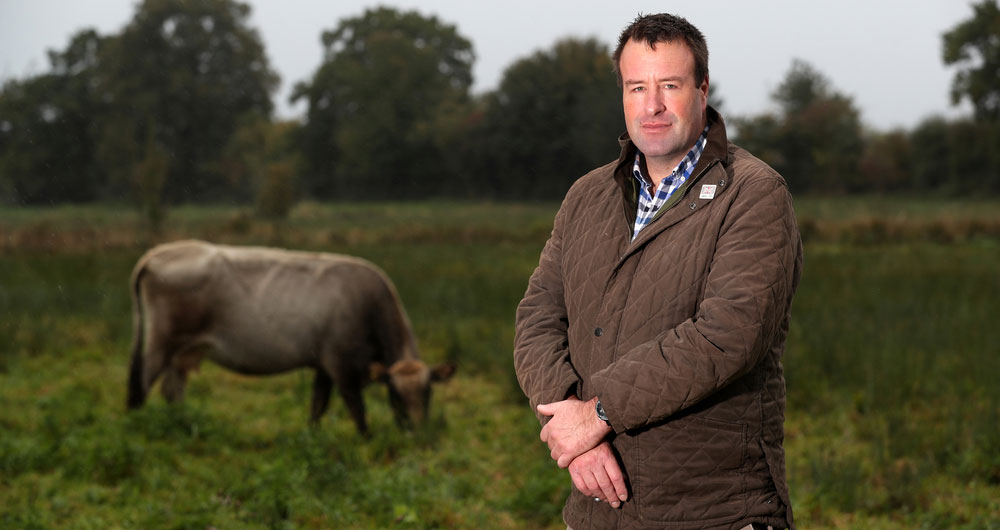British livestock farmers across the country are dedicated to delivering top-quality, climate-friendly food, produced to some of the highest animal welfare standards in the world. Many of them will also spend their lives fighting what feels like a losing battle against bovine TB, a devastating disease that can cripple a farming business and push many farmers to despair.
Rarely a week, or even a day, will go by where I don’t speak to a farmer about bovine TB. They tell me about the utter devastation it causes. They share with me the emotional strain it puts not just on them but their family. They tell me, often in tears and in anger, how generations of breeding cattle from their farms have been lost overnight, culled after receiving a positive TB test. This effectively closes the farm business and it will remain closed until a clear TB test, which can take months, if not years to achieve.
For these farmers, the government’s 25-year strategy to eradicate bTB really is the only light at the end of a very dark tunnel. It means tackling the disease using a broad range of science-based interventions and it remains the only solution we have.
It’s no surprise there are critics of the policy. The broad range of interventions includes cattle culled when testing TB positive, comprehensive cattle movement controls, a myriad of TB testing requirements, higher biosecurity on-farm and it includes a cull of badgers in areas where the disease is persistent and high.
The reason? In order to deliver the government’s 25-year strategy, to eliminate this terrible disease from our cattle and our wildlife, we learned long ago that we must break the cycle of infection that exists between badgers and cattle. The end goal is a countryside populated with healthy badgers and healthy cattle.
Why am I writing this article?
In the pages of The Times this week, wildlife filmmaker Steve Backshall became the latest person to come out and criticise the TB eradication policy, badger culling in particular. Given the array of inaccuracies he included in his piece, we contacted The Times for a right of reply. It’s too important an issue to leave with facts misreported and misunderstood and it's all-important for the farming community to have its side of the story told.
We were told that there wasn’t space.
To tell this story right, we need to start at the beginning. Bovine TB is spread between badgers and cattle. This is a fact. Government data shows that more than 60% of new TB incidents in High Risk Areas are attributed to badgers. Remember, more than 30,000 cattle were slaughtered last year because of this disease, with over 3,300 cattle herds affected. Badger culling is one part of an important package of measures designed to tackle this disease, working hand-in-hand with enhanced biosecurity, cattle movement controls and cattle testing programmes.
And importantly, the strategy is working. To those you hear say the policy isn’t effective, and that badger culling isn’t having a positive impact bearing down on the disease, this simply isn’t true. But don’t take my word for it. There is peer-reviewed evidence that shows significant reductions in TB in cattle in areas where culling has taken place for four years. You cannot argue with evidence showing 66% reductions in Gloucestershire and 37% in Somerset. Not only that, the government’s Chief Vet also says it is working and delivering results.
There are those that very vocally advocate badger vaccination as being the solution to this long-standing disease. But we must always look at the facts. Surveys have proved the disease is endemic in some badger populations. Badger vaccination will not cure this infection. It’s no use relying on vaccination to eradicate the disease because very simply there is no evidence so far that badger vaccination has any effect at all on reducing TB in cattle herds. It remains crucial that we stop giving badger culling and badger vaccination a false equivalence which has no basis whatsoever in science.
I recognise that this is an emotive issue with strong views on both sides and I am not alone in wanting to see a TB free country with healthy cattle and healthy wildlife. I will continue to speak out to ensure the facts are heard and the farming story is told.
The evidence shows us that badger culling is working and delivering tangible results in taking us all a step closer to stamping out this disease. We mustn’t for misguided reasons stray from the evidence or take away the light at the end of the tunnel for thousands of farmers and their families, just when they are beginning to see results.
More from the NFU on bovine TB:
More from NFUonline:
- Join our virtual events this party conference season
- NFU Live: Events from the NFU this autumn
- Watch now: Your weekly video update from the President

